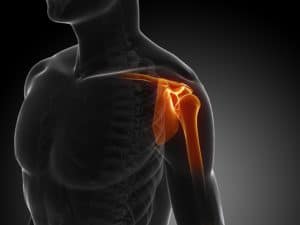 The joints in the body allow for movement, but the shoulder joint is the most vulnerable as its the body’s most mobile joint. Due to this versatility, the shoulder joint can be unstable, leading to dislocations.
The joints in the body allow for movement, but the shoulder joint is the most vulnerable as its the body’s most mobile joint. Due to this versatility, the shoulder joint can be unstable, leading to dislocations.
Context
In the shoulder joint, the head of the humerus (upper arm bone) sits in the glenoid fossa, an extension of the scapula, or shoulder blade. The glenoid fossa is a shallow depression, and due to that, the surrounding areas are needed to maintain stability. The labrum, within the joint, extends from the glenoid fossa and provides a deeper receptacle for the humeral stability joint.
When the head of the humerus is forcibly removed from the shoulder, a dislocation occurs. Dislocation can happen in a multitude of different directions, and the dislocation is described by the location of where the humeral head ends up following the dislocation. Almost all dislocations are characterized as anterior dislocations as the humeral head ends up positioned in front of a joint.
However, with some dislocations, posterior dislocation is possible as the humeral head would have moved backward toward the shoulder blade. In rare situations, dislocations include luxatio erecta, which is where the dislocation occurs below the joint or an intrathoracic, which is when the humeral head is lodged between the ribs.
What Happens When A Dislocation Occurs?
When an anterior shoulder dislocation occurs, the shoulder is usually in a vulnerable position such as having the elbow bent and behind then head when force is received, causing the humeral head out of the fossa. This type of injury is common among baseball and volleyball players, as they are more likely to fall on top of their outstretched hands. When an anterior dislocation occurs, the shoulder faces an external rotation, which is when the shoulder rotates away from the body.
Posterior dislocation is a result of more specific causes such as electrical injuries or seizures. This type of damage is also common in the elderly and can occur from minimal swelling, and is also commonly misdiagnosed for shoulder pain.
Shoulder dislocation in young people is often caused by some area of trauma, most commonly resulting from sports injuries or even falls. With the older population, dislocations are caused by the gradual weakening of ligaments and cartilage in the shoulder. Age, however, isn’t always the only factor involved in dislocations in older patients; some force still needs to occur for a dislocation to occur.
What Puts You at Risk for Shoulder Dislocation
Shoulder dislocations tend to occur in two age groups:
- The most common cause of shoulder dislocation in young people is sports-related injuries.
- Those who are elderly and are more susceptible to falls are also at risk. The collagen fibers in the tendons and cartilage tend to break down as the body grows older, making the surrounding structures of the shoulder weaker.
When trauma occurs, dislocation can occur.
Who Treats Dislocations?
If you suspect a shoulder dislocation, treatment should be sought by medical professionals in an emergency room. Doctors in the Emergency room are trained to treat and diagnose dislocations as well as to provide you with ways to ease the pain.
Once you have received a diagnosis of a shoulder dislocation, you will be referred to an orthopedic specialist who will determine the next course of action. In some cases, monitoring may be all that is necessary, but in other cases, surgery may be suggested to help prevent future dislocations.
An orthopedic doctor may also have you work closely with your primary care doctor, a physical therapist, and if need me a sports medicine physician as well to ensure you have the best chance of recovery.
Symptoms
When the shoulder is dislocated, pain is always present and can be excruciating. Mobility of the arm is minimal, and there is a possibility of spasms in the arm. As the humeral head is often moved out of place, the shoulder may appear to have a bulge, which is usually a telltale sign of dislocation.
The body may also begin to experience nausea, vomiting, and sweating as the pain increases, and adrenaline rises in the body.
How Are Dislocations Diagnosed?
If shoulder dislocation is suspected, the first measure of concern is joint relocation and managing the pain. Your doctor will also ask questions in regards to allergies, family history, and if this happened before as that may alter their treatment plan. Upon examining the shoulder, the doctor will look for a “squared-off” shoulder, which will have a loss of a healthy rounded appearance.
An X-ray may be taken to help confirm the diagnosis as well to rule out any other conditions such as fractures. Common shoulder fractures are Hill-Sachs deformity, which is where the humeral head experienced a compression fracture, and the second is a Bankart lesion, which is when there is a chip in the glenoid fossa.
To ensure that all angles are covered in an x-ray, two pictures are taken, one from the anterior side and a second from the posterior side to cover all angles of the humeral head.
Shoulder dislocations are painful, and our team of Atlanta orthopedic doctors is highly skilled at treating this condition as well as providing education to help prevent future dislocations. If you experienced dislocation and need a specialist to help you on your road to recovery, our team of specialists is ready to help you now, and by calling (404) 855-2141, you are taking the first step on your road to recovery.





